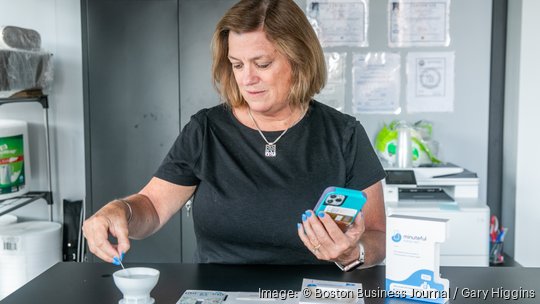
Over the past few years, digital diagnostics have gone from a novelty in the healthcare system to a tool patients and providers are using in areas like dental care, dermatology and cardiovascular and kidney diseases.
The recent interest in digital diagnostics — the application of tech in medical diagnoses and treatment plans — is being driven by advances in technologies like artificial intelligence, as well as innovations borne out of the pandemic. Local healthtech companies have worked to build trust among users in order to increase acceptance of digital diagnostics among patients, medical professionals and insurers.
Pandemic-driven evolution
Healthtech leaders say some of the growth in the field is the result of the pandemic, which caused both at-home testing and telehealth to take off.
Granted, following the directions on a rapid Covid-19 test to see whether one or two lines appear is a step below using smartphones as testing tools. But Paula LeClair, U.S. general manager of Healthy.io, said the pandemic created a window of opportunity to advance at-home digital diagnostics.
Healthy.io is building a suite of smartphone health tools, with a focus on the U.S. market for its FDA-cleared test to gauge a person’s risk of cardiovascular and kidney diseases. The process involves an at-home urine test read by a smartphone camera.
“I think of Covid as almost a pilot,” LeClair said. “It was a pilot for everyone to see: Can all ages, can all demographics, can all people actually test at home?”
LeClair said most people found they actually preferred the convenience of at-home tests to visiting a medical center.
People in the process
The pandemic wasn’t the only factor in pushing forward digital diagnostics over the last few years. Healthtech companies have also taken steps to assuage customer concerns with adopting digital diagnostics.
LeClair said one of patients’ main concerns is whether they can trust a company with health data. Healthy.io mandates HIPAA training for its team, and doesn’t sell patients’ personal health information, she said.
Instead of trying to sell directly to consumers, the company sells its tests to health systems which provide them for free to patients, especially those at risk of cardiovascular and kidney diseases. Before the tests show up on their door, LeClair said Healthy.io sends each person a letter.
“It says your health plan is really concerned about you. They realize that you didn’t do this test in the last year and you will be receiving a kit in the next week. If you don’t want it, or you’d rather go see your physician, here’s the number to dial,” LeClair said.
Another patient concern is whether they can correctly use the technology. LeClair said her company provides step-by-step instructions in their app. The company also has a call center with a translation line that helps people complete the test. Then, Healthy.io gets the abnormal test results back to patients’ physicians.
Susan Conover, co-founder of Piction Health, a virtual-first dermatology practice, said she’s given a lot of thought to building trust with patients who are used to seeing a dermatologist in person. The startup provides patients with personalized care plans for skin, hair or nail issues. Patients submit their medical history and photos of their problem areas, and Piction’s board-certified dermatologists review this information and create a personalized care plan within two days.
Conover believes that digital diagnostics shouldn’t completely remove people from the equation. The startup uses AI to give patients feedback on the usability of photos they submit and helps route patients to the right providers, but in addition to the dermatologists who review each case, licensed nurse practitioners meet with each patient virtually to review the plan.
Piction also recently introduced a new system where patients can directly text the company with questions.
“We’re continually iterating on how do we build a relationship that’s trusted over time through technology and augmenting with real conversations with providers,” Conover said.
Minimizing room for error
Not all digital diagnostics are used by patients. Digital diagnostics are also becoming more widely accepted by medical professionals in their own practices.
Founded in 2018, Boston-based Overjet uses computer vision to analyze dental x-rays, according to chief strategy officer Ryan Kennedy. The company’s products can be used by dentists for diagnosing issues like cavities or bone loss and translating X-ray data into language better suited for patients. Overjet also uses its technology to review reimbursement decisions for insurance companies.
“On the provider side, there’s a big range in reaction to AI. Providers, when they see it, they’re like, this is the greatest thing ever,” Kennedy said. “You also definitely have a set of providers who I would say feel like their diagnosis is already sufficient, and they don’t need anything to help them.”
Kennedy said the best way to win people over is to get them to try the technology. Even then, Kennedy said some will say it over-diagnoses or under-diagnoses problems. Kennedy said it’s important to set expectations, and clarify that the tool is meant to support dentists’ work, not replace them.
“Look, AI is absolutely going to make errors. But they’re going to make different errors than you would as a human being,” Kennedy said. “What we want to happen is that if we overlaid the amount of errors that AI will make and the amount of errors that you would naturally make as a clinician, ideally the surface error of the remaining areas is much smaller than either of you working independently.”
Sign up for The Beat, BostInno’s free daily innovation newsletter from BostInno reporter Hannah Green. See past examples here.








